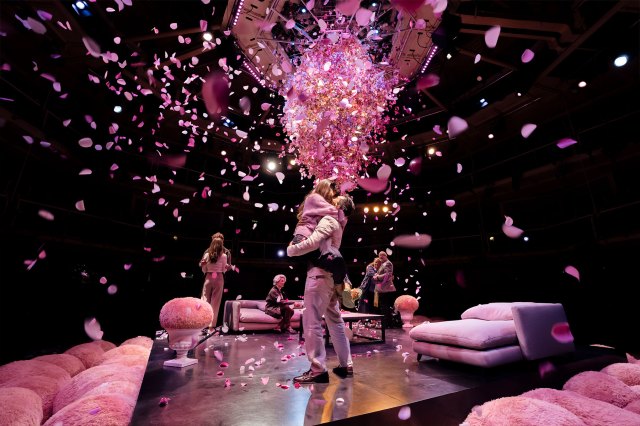The Importance of Being Earnest at the Royal Exchange Theatre – review
Josh Roche’s revival continues until 20 July

Usually, in Oscar Wilde’s play where two men tangle and trip themselves up by taking on double identities to seduce wives, the identity crisis is the characters’. But this production has one of its own: romance or comedy?
In spite of the subtitle, “A trivial comedy for serious people”, it treats those romantic schemes as though they’re serious prospects, too earnestly, actually detracting from the comedy that’s never allowed to go full-tilt absurd.
These plots arise from Algernon’s discovery that the friend he’s always known as Ernest is, in fact, plain Jack. That name is just a pseudonym he adopts when he’s frolicking in town; “Jack” allows him to become a reputable man again while stewarding his young niece, Cecily, in the country. It inspires Algernon to do the same, claiming the Ernest persona for himself to access Cecily, unaware that Jack will soon kill off the character when he decides to commit to Algernon’s cousin, Gwendolen.
They’re deliberately thin, flimsy and unlikely relationships. Algernon is in love, but it should convey the ludicrousness of wealthy men finding an occupation to fill the vacuum of their aimless, languid lives. Instead, the romance is played straight and seriously. Not only does his hyperbolic fawning lack irony, but it’s reinforced by Josh Roche’s direction. Rumi Sutton’s Cecily slowly walks up to him while ambient music swells, as it does when he declares “I’m in love”.
We’re put in an awkward position where we’re encouraged to get behind something so shallow and preposterous. It’s only in the second half when the plots unravel into farce, with Wilde manufacturing openly ridiculous contrivances, that Roche permits a belated tip into melodrama.
Parth Thakerar’s Algernon tells Jack “I’m not much interested in your family life” with a flutter of his hand as though dismissing a servant. But he could do more to suggest the vanity and vacuity of this dandyish rake. His conceited lines about adultery and hedonism – “The only way to behave to a woman is to make love to her, if she is pretty, and to someone else, if she is plain” – are casually delivered, so his performance is contained when you want it to froth.
Sutton’s Cecily flits between strong-minded and self-possessed, then clueless, airhead teenager. It’s exposed in one of the play’s comic high points, her skirmish with Gwendolen. It should be a perfectly matched toe-to-toe clash, but her retorts and retaliations are dampened by sullenness, rather than calculated, venomous cuts. She’s effectively railroaded by Phoebe Pryce’s seething, stinging barbs, while a coffee machine enjoyably provides loud interruptions that raise the tension and her visible annoyance.
Eleanor Bull’s brilliant set vividly signals artificiality. A mass of dried flowers overhead are scrunched rather than blooming. Cloud-like pouffes resemble a soft-play playground for the rich.
If the floral canopy supplies the rose petals, Abigail Cruttenden’s Lady Bracknell supplies the thorns. With a small shriek or point of a finger, she commands characters to sit, like they’re her pooches. Her head tilts and narrowing eyes are as much condescending gestures as they are suggestions that the country climate causes her discomfort. Her voice seems higher than when she’s in the town, again as though an allergic reaction.
There are fun moments of slapstick including a food fight, and it’s updated seamlessly to the present day with references to Bicester and phones serving as the modern-day diary. It all makes for a light and breezy summer show, but one that could fizz more with irreverence if it didn’t take Wilde’s title as a director’s note.
















